Since 2017 a team of volunteers at The National Archives has been devoting its time to the series WO 416, preparing the item descriptions ready for the catalogue (Discovery) ahead of the planned opening of the whole series in 2023. The series comprises 414 boxes of German record cards of British and Commonwealth prisoners of war and some civilian internees. The year 2028 is a critical date as by then it is calculated that all persons mentioned on the cards would have passed their 100th birthday and therefore, under current regulations, the records may be opened in entirety for public inspection.
Previous blogs on this series have featured, among others, The Guinea Pig Club (early plastic surgery), and the most senior RAF Bomber Command officer captured, Air Chief Marshal Sir Ronald Ivelaw-Chapman. Recently a card for a civilian internee came to our attention that has revealed another interesting story.
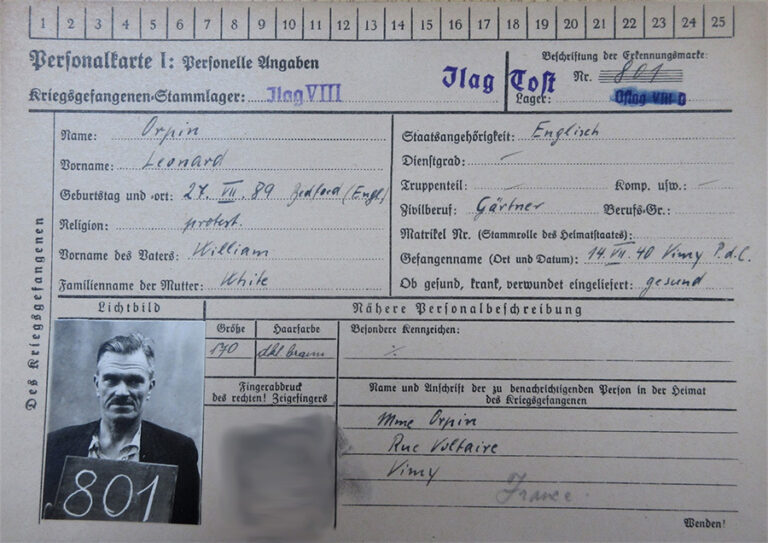
Leonard Orpin is shown as being born in 1889, a gardener by occupation who was captured on 14 July 1940 at Vimy, Pas-de-Calais. Could he possibly be an employee of the Imperial (later Commonwealth) War Graves Commission? This is the story that subsequent research by a member of the WO 416 volunteer team has revealed.
Leonard Orpin was born at Bromham Mill, Bedfordshire on 27 July 1889, the son of William J Orpin and his wife May Orpin. William was the flour miller at Bromham Mill and Leonard was their eldest child.
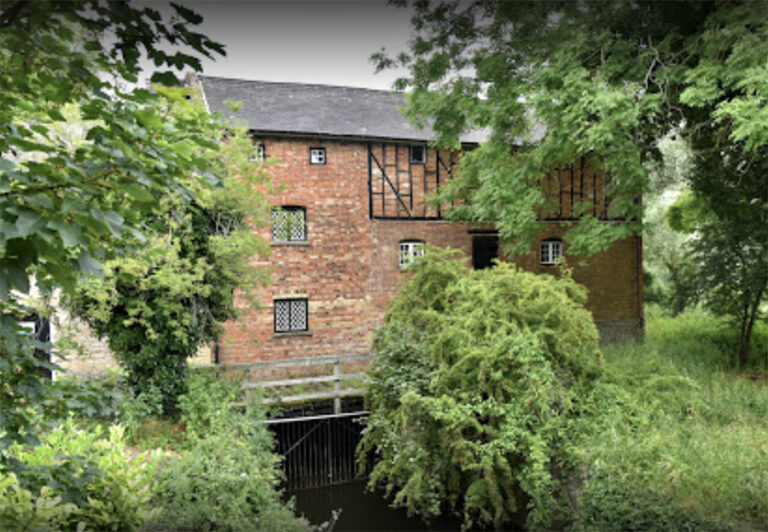
The family can be traced in the census returns for 1891, 1901 and 1911. In 1911 Leonard, now aged 21, is shown still living at Bromham and working with his father as a miller.
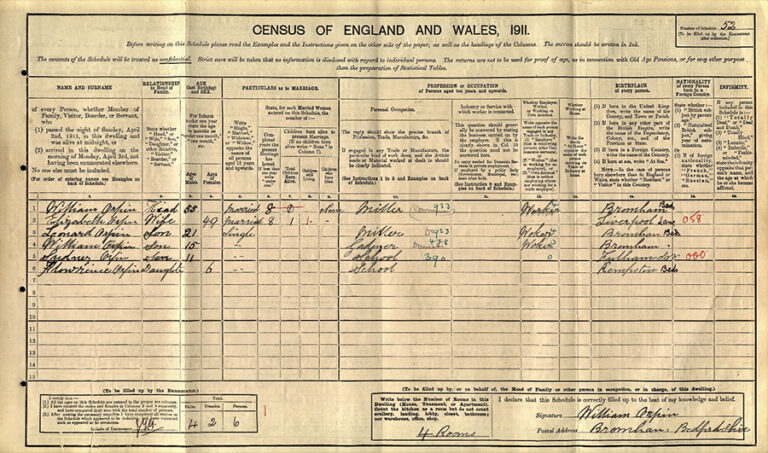
Following the outbreak of the First World War in August 1914, Leonard enlisted in the army. Unfortunately his service records have not survived and it is assumed they were destroyed following enemy action during the Second World War. It is known, however, that he joined the Bedfordshire Regiment and was posted to the 6th Battalion. The 6th Battalion was a ‘Service’ battalion, raised in August 1914 specifically for the duration of the war, as a part of ‘K1’ – Lord Kitchener’s first call to arms for 100,000 men to fight for their country against the king’s enemies. Leonard was trained as a Signaller and appointed to the rank of Lance Corporal before embarking for France on 11 December 1915. Prior to departure for France, the battalion was photographed and there appears to be a marked similarity to L/Cpl L Orpin seated second from the right in the second row from the front in the photograph of the 6th Battalion Signallers.
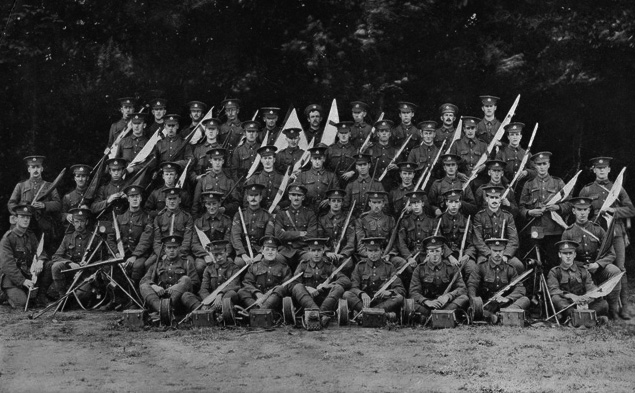
The 6th Battalion served entirely on the Western Front and L/Cpl Leonard Orpin is recorded in the Battalion war diary of 25 October 1917 (WO 95/2537) as having been awarded the Military Medal for bravery in the field. The award was fully reported at the time in Orpin’s local home newspaper, and the official notification of his Military Medal then followed in the London Gazette of 14 January 1918, page 841. No record of his actual act of bravery can be found, however it is most likely that this occurred early in October 1917 in the area of Ypres. (Acknowledgement is made to Chris Bate from the First World War Military Medal Project who provided the war diary and local paper references).
The men of the 6th Battalion were transferred into the 1/1 Hertfordshire Battalion in May 1918 and a small cadre was sent to train the newly arrived American divisions. Finally, in August 1918, the cadre was disbanded and the 6th Battalion of the Bedfordshire Regiment ceased to exist. Promoted to Corporal, Leonard Orpin is shown as attached to the Hertfordshire Regiment in the Bedford Division Absent Voters’ List for 1918 under the Parish of Bromham, reference 2753.
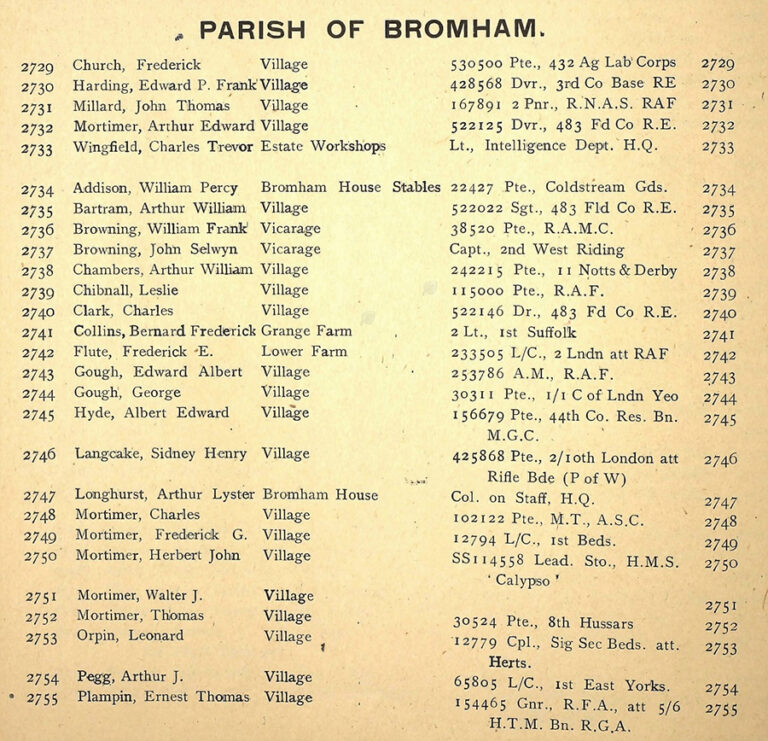
Leonard Orpin’s First World War service came to an end when he was demobilised and transferred to the Class Z Reserve on 11 March 1919. His medal record card records that he was issued with the 1914/15 Star, British War and Victory Medals. This card is additionally referenced ‘War Graves Commission 15.10.75’, indicating that our initial thought that he could subsequently be an employee of the Imperial War Graves Commission was in fact correct.
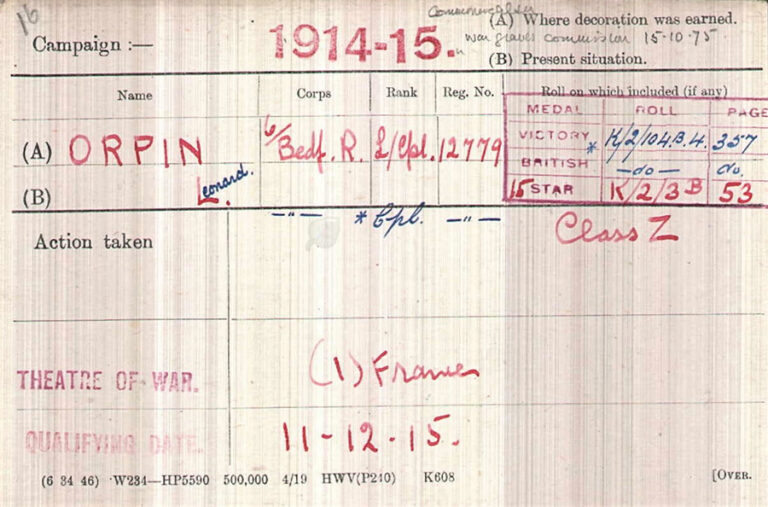
The Medal Index Card (as its title infers) refers us to the page references for the 1914/15 Star and the British War and Victory Medals. These can be found in WO 329/2662 pieces WO 329/928 respectively. Additional information found on the 1914/15 Star roll confirm his date of demobilisation.
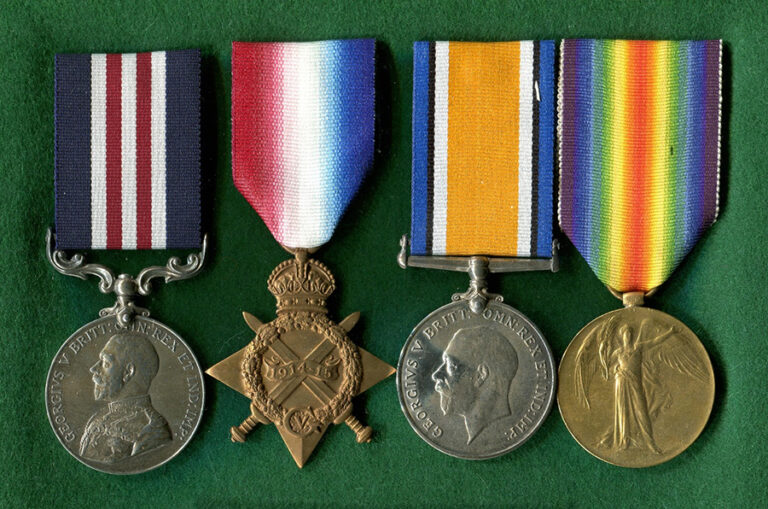
Having confirmed our original suspicion that the Second World War prisoner of war Leonard Orpin, whose record card we had found in WO 416/278/96, was an employee of the Imperial War Graves Commission (IWGC), the next step was to seek confirmation from the Commonwealth War Graves Commission (CWGC) – the Commission changed its title from ‘Imperial’ to ‘Commonwealth’ in March 1960. Fortunately George Hay, the official historian at the Commission, previously Principal Military Records Specialist at The National Archives, provided us with details of his employment with the Commission.
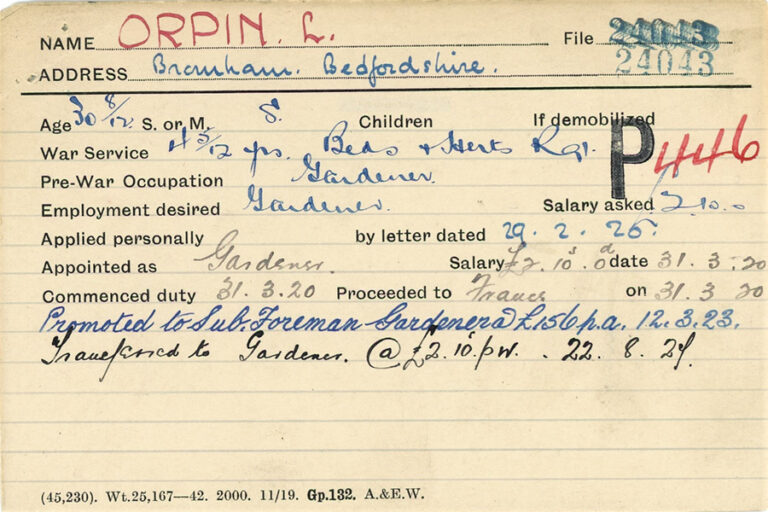
The record card tells us that Leonard Orpin applied to the Commission by letter (dated 29 February 1920). He was duly appointed gardener at a salary of £2.10s and proceeded to France on 31 March 1920 to take up his duties. He was promoted to Sub. Foreman Gardener at a salary of £156 per annum on 12 March 1923, but subsequently reverted to his former position as gardener at his previous wage of £2.10s per week on 22 August 1927. The card also refers to his First World War service of 4 years 5 months with the Beds and Herts Regiment.
Leonard Orpin’s Second World War Civilian Internee Record Card (WO 416/278/96) records that he was captured (interned) on 14 July 1940 at Vimy, Pas-de-Calais. Records held by the CWGC reveal that he was married to Rosine and had three daughters and that his home address was Rue Voltaire, Vimy, Pas-de-Calais.
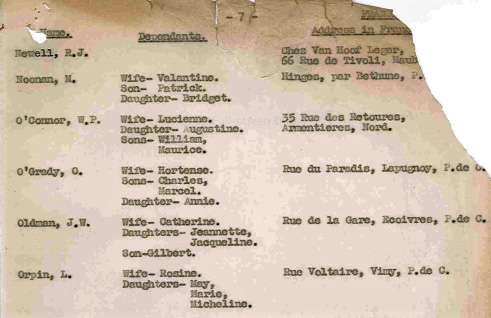
News reached his mother, who was still living at Bromham, that her son was a prisoner of war and this was reported in the Bedfordshire Times on 6 December 1940. His final release from captivity took place at Giromagny and was arranged following a repatriation of prisoners. Leonard returned to his sister’s home and remained there until the end of the war, before finally returning to his family in Vimy to resume his employment with the IWGC.
Following the end of the Second World War the Commission staff were instructed to wear civil defence uniforms and were identified by a distinctive cloth shoulder title bearing the letters IWGC.
Records obtained from the CWGC show that Leonard Orpin continued in their employment until he reached the retirement age of 65 on 31 July 1954. He was awarded a retirement gratuity of £439.16s.8d and granted a pension of £146.13s per annum. It is believed he continued to live in France with his family and is recorded as dying on 1 December 1967 aged 78. His widow continued to draw her pension from the commission until her death on 2 October 1985.
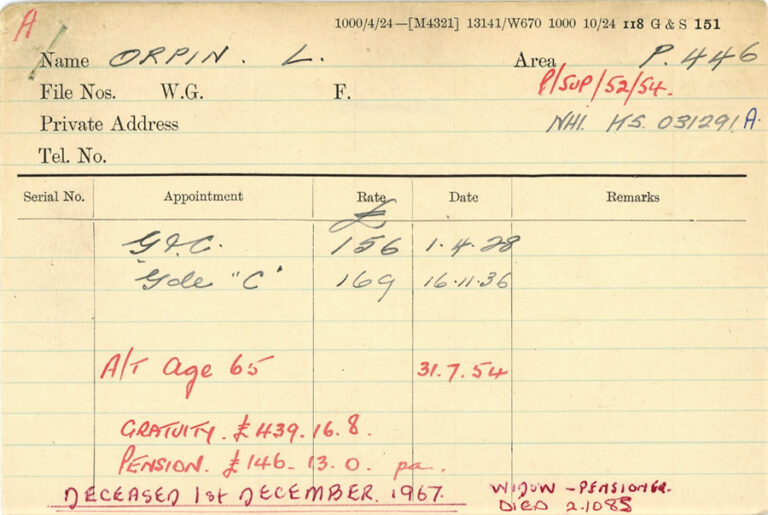

There are also cases of men who stayed on in France after the First World War serving with the then Imperial War Graves Commission and were arrested by the Germans during the Second World War, these are in series FO 950 (compensation for persecution by the Nazis).